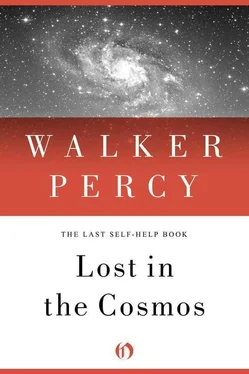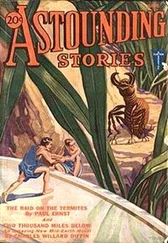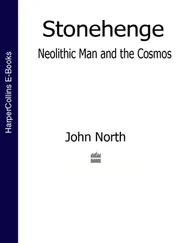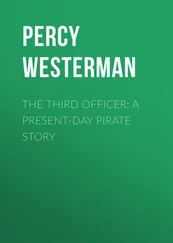I am willing to believe it, but where do all the child molesters come from? Look out for benign types like Charlie Kuralt.
And are there not millions of ordinary American families with hardworking devoted husbands, loving wives, good kids, who live happy lives, have a good time without promiscuous sex, drugs, or violence, and on the whole turn out well?
Undoubtedly. In fact, I am amazed how extraordinarily nice most young people are, extraordinarily nice and extraordinarily ignorant.
And don’t some people fall in love with their heart’s desire, marry, and live reasonably happy lives?
Some. For a while. Maybe. I can’t say.
Don’t you believe in love?
Yes, but the word has been polluted. Beware of people who go around talking about loving and caring.
And are there not plenty of sincerely religious folk left, Christians and Jews, whose lives are filled with the joy of the love of God and who go about doing good?
Perhaps. Some, I suppose.
And are there not still religious folk, women who give their very lives to serve God and their fellowman, all for the love of God?
Well, some — though for every Mother Teresa, there seem to be 1,800 nutty American nuns, female Clint Eastwoods who have it in for men and are out to get the Pope.
Then what are you saying beyond the commonplace that there are now, just as there have always been, “good” people and “bad” people; or, if you prefer, people with traditional value systems and people with new life styles?
I am only trying to make sense of a peculiar phenomenon, hardly to be ignored: the sudden and unprecedented appearance of florid sexual behavior and the overt and covert practice of violence to the point of rendering cities unlivable, of nice people like Europeans and Americans killing each other by the millions — and with it, the very real possibility for the first time in history that we may destroy ourselves in the near future.
Decency is as may be, but decent or not, the autonomous self is devolving upon what seems to it a simple and reasonable view of sexuality. In view of its low cost and availability, the easy prevention of disease and pregnancy, could anything seem more reasonable than that the traditional Judaeo-Christian strictures against premarital and extramarital sex are anachronisms — especially the former in view of the fact that teenagers are at the height of their sexual powers? Even the good, gray New York Times takes it for granted. In an editorial protesting certain criticisms of the availability of contraceptive devices to teenagers without parental consent, the Times editorialist wrote: “Some Americans apparently find emotional satisfaction in encouraging teenagers to deny or postpone their sexuality. It is a costly fantasy, diverting attention and resources from a real world.”
Why indeed postpone or deny the sexuality of teenagers? Admitting the true state of affairs is surely more honest than retaining a Christian veneer and practicing the sexual mores of Dallas and The Love Boat.
Does it only remain then to pause and wonder how such a mistaken view of sexuality could have informed the entire Western world for two thousand years? One needs to speak plainly here. It is, after all, not a small matter to discard such a traditional view so casually and so quickly. Nor should one deceive oneself about the consequences of “correcting” the mistake.
The deception may come from concealing from oneself the inevitable nature of sexuality in a post-Christian and technological society by substituting for the lost god and the lost commandment such surrogate goals as “responsible” sexuality, “commitment,” “sharing,” and so on.
These humane and in fact admirable properties of a good sexuality as opposed to a bad sexuality may in fact obtain, but it is necessary to note without prejudice that once sexual behavior is viewed objectively as an option of the autonomous self, it will also be viewed necessarily and quite reasonably as a source of pleasure and a need-satisfaction and as such subject to those techniques of the age by which such satisfactions are best arrived at and with the least damage to others. And why not? Cannot recreational sex be enjoyed responsibly, that is, without damage to one’s health or the health of others, physical health and emotional health? One can eat one’s cake and have it too. The words responsibility, mutuality, sharing, caring, are easily added, the cake’s icing.
A SHORT HISTORY OF THE DEMONIAC SPIRIT OF
THE EROTIC AND THE VIOLENT IN THE CHRISTIAN
ERA,
IN THE TRANSITION FROM
THE CHRISTIAN ERA TO THE TECHNOLOGICAL ERA,
AND FINALLY IN A PURELY TECHNOLOGICAL ERA
St. Paul: The triumph of the spirit over the flesh, but still bothered by a “thorn in the flesh” (unlike Socrates, who wouldn’t have worried).
St. Augustine: The triumph of the love of God in the City of God over lust in the city of man, but—“Grant me the gift of continence, but not just yet.”
Dante: Sexual sinners in the outermost, least punitive, circle of hell, storm-tossed, blown to and fro like birds on the winds of desire, yet still together and still in love. Cf. traitors and murderers in innermost circle, up to their necks in boiling pitch.
Chaucer’s Miller and Wife of Bath: The frankly erotic harmonized comically and humanely as earthy transgressions, committed and recognized as sins, but without neurotic guilt and to be forgiven by the loving Lord and Master, the goal of the Canterbury pilgrimage.
Don Giovanni: The appearance of the pure demoniac spirit of the erotic; the Don’s seduction of 1,003 women set to the joyful music of Mozart; yet this same spirit of the erotic posited by Christianity, e.g., the damnation of the Don and his descent before our eyes into the fires of hell.
Fanny Hill: The spirit of the erotic in English pornography; the sinister charm of secret sex under the veneer of Christian proprieties and layers of Victorian clothes; the white skin of thighs against black stockings.
World War I: Joyce Kilmer’s poetry, Colleen Moore in Lilac Time, “ Mademoiselle from Armentières”; the erotic diminished to the sentimental and to good-natured sex between the doughboy and the French farm girl; with a decline in passion and the spirit of the erotic, and an increase in violence with the rise of technology; 20,000,000 dead.
World War II: Betty Grable, Anne Frank, Adolf Eichmann, Stalin; the subsidence of the erotic in favor of a rise in the dispassionate, abstract violence of ideology, Fascism, Nazism, Communism; war increasingly in the hands of technicians; the decency of Truman and Oppenheimer contrasted with the death of 100,000 women and children in Hiroshima and Nagasaki; Arendt’s banality of evil = the growing disparity between the monstrous violence of technology and the smallness of the technician-perpetrators; World War II as a transition period between the decline of the Christian era and the rise of the age of technology; 50,000,000 dead.
Period between World War II and World War III: The ascendancy of the erotic; the eroticization of all sectors of culture: work and play, films, TV, novels, plays, commercials; yet the spirit of the erotic is still posited and specified by lingering Christianity, e.g., the charm of the secrecy of sex under clothes, the charm of “forbidden” sex, liaisons, pornography; pornography as “dirty” yet interesting, or rather, “dirty,” therefore interesting; the hypocrisy of some critics: critics who say that pornography is dull, whereas in fact pornography is for many readers the last resort of interest after the disappointments of age; the critic, of all people, knows that the non-pornographic novel is generally so boring that he hopes for the “dirty part” like a schoolboy looking for the “good parts” of Ulysses.
Читать дальше












